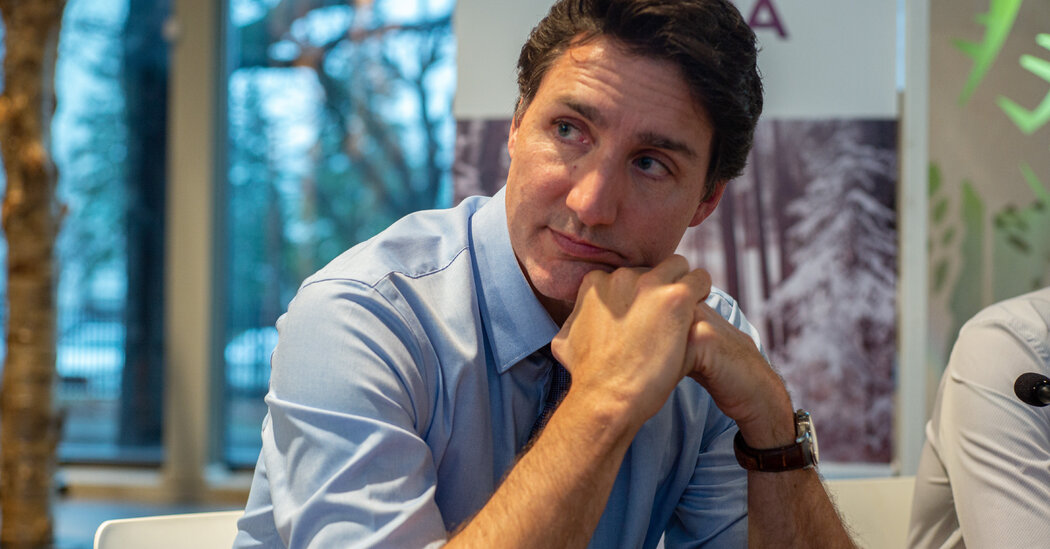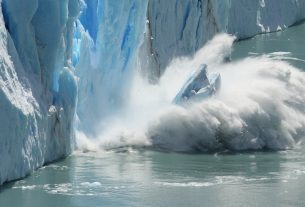After a two-year delay because of the pandemic, government delegations from around the world have gathered in Montreal to try to reach a 10-year agreement to reduce biodiversity loss, under a United Nations treaty called the Convention on Biological Diversity.
In advance of the meeting, my colleagues Catrin Einhorn and Lauren Leatherby prepared an image-rich article laying out what’s at stake. And Catrin, who will be in Montreal reporting on the meeting, also spoke with Manuela Andreoni of the Climate Forward newsletter about the meeting, commonly known as COP 15.
[Read: Animals Are Running Out of Places to Live]
[Read: Can We Save Nature?]
During the second day of the conference, I was part of a group of six journalists who met with Prime Minister Justin Trudeau and Steven Guilbeault, the minister of environment and climate change. Here are some extracts, edited for clarity and length, from that interview.
At the outset of the conference, Canada announced that it would spend 800 million Canadian dollars to develop four new Indigenous protected areas. I asked Mr. Trudeau how the government could make deals with Indigenous communities that have rifts between members who recognize traditional leaders and those who support elected band councils on development and environmental issues:
Justin Trudeau: Understanding that we need different things for different situations is the best we can do and is, quite frankly, a lot more challenging from a policy level. But ultimately it is the only way that it actually turns the colonial approach that we’ve all inherited on its head and puts them back into control a little bit more.
On who is speaking for them and who is in control: That’s not for us to decide. There are some communities that have resolved their ceremonial power versus political power question. There are others that are still a little bit in discussion about what it actually means. I think we just have to be helpful and patient around encouraging them to determine what is suited for them. And the question of the Coastal Gas pipeline and the Wet’suwet’en is a clear example of a clash between hereditary chiefs and elected chiefs.
We have to try and help them resolve this at their pace and in their way. And that sometimes means taking a good step back and giving them the space to be able to do that.
On the potential conflict between developing mines for minerals needed to lower carbon emissions, and maintaining natural habitats:
Justin Trudeau: We can say, “OK, lithium is too messy to mine. We’re not going to mine it anymore.” But then we’re just accepting that China gets to export lithium to the world, and other places that aren’t going to follow any of the environmental restrictions that we would put on it.
Then you have to ask the question: Is there a market for lithium mined in Alberta with the better environmental standards, better labor standards than in many other parts of the world? Is that, which is going to be more expensive, still something that’s going to achieve a market?
What we’re seeing from partners around the world is that having a reliable source of these critical minerals, even if it’s more expensive because it’s done properly and responsibly, is totally worth it — there is a market.
On whether Canada’s plan to protect 30 percent of its land over the next 30 years, a goal the country is promoting at the conference, is adequate:
Justin Trudeau: The framing of “You’re saying you’re doing this, but it’s not enough” is the reality of the existence of any progressive government. No matter what we set out to do, there’s always more to do, and we have to embrace that.
Canada has always had lots of plans, lots of targets. But actually doing it and getting the momentum going in the right way is the challenge.
So it’s always trying to find that moment where you can bring people along. Like, for years, we talked about climate change as a challenge. Yes, but it is also an opportunity. Nobody felt the opportunity. They just felt the challenge.
But now we’re starting to see the opportunity, whether it’s critical minerals, batteries or the hydrogen deal with Germany — there’s a range of things. We now have industry coming to us and asking about the carbon price: How do we make sure that it endures? Because if we’re going to be making these investments, which we are, it has to actually hold. And if some other government comes along and scraps it, then we’re in big trouble.
Trans Canada
-
Celine Dion revealed this week that she has a severe neurological disorder that is forcing her to postpone shows to rebuild her strength and “ability to perform again.” Here’s what we know about the disorder, stiff person syndrome, a condition so rare that it affects perhaps only one in a million people.
-
Alex Hawgood spoke with Margaret Atwood about Virgule, her utopian dream community where people live in dome houses and wear mushroom leather.
-
The Keystone pipeline, owned by TC Energy of Calgary, has spilled 14,000 barrels of oil into a creek in northern Kansas. In 2019, about 383,000 gallons of crude oil leaked from the Keystone system in North Dakota.
-
Amy Virshup loved the skiing at Club Med Québec Charlevoix. But she found that the resort itself still had some kinks to iron out.
-
Montreal-based Solios is featured in a roundup of sustainable watch makers.
-
As Canada and other nations harden their positions toward China, its leader, Xi Jinping, is returning to the global stage to repair China’s position.
-
For the New York Times Magazine, Devin Gordon followed an informal Team Canada as he looked into Ironman XC, “a small subcategory of Ironman that caters to high-achieving, time-strapped business executives.”
-
A cedar-shingled, three-bedroom home that occupies nearly six acres on the southern shore of Quadra Island in British Columbia is one of the International Real Estate editors’ favorite listings of 2022.
A native of Windsor, Ontario, Ian Austen was educated in Toronto, lives in Ottawa and has reported about Canada for The New York Times for the past 16 years. Follow him on Twitter at @ianrausten.
How are we doing?
We’re eager to have your thoughts about this newsletter and events in Canada in general. Please send them to [email protected].
Like this email?
Forward it to your friends, and let them know they can sign up here.



